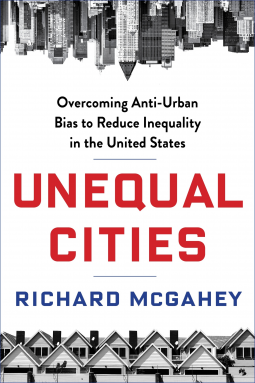Please wait... This may take a moment.
Unequal Cities
Overcoming Anti-Urban Bias to Reduce Inequality in the United States
This title was previously available on NetGalley and is now archived.
Pub Date
Jan 10 2023
| Archive Date
Apr 05 2023
Description
Cities are central to prosperity: they are hubs of innovation and growth. However, the economic vitality of wealthy cities is marred by persistent and pervasive inequality—and deeply entrenched anti-urban policies and politics limit the options to address it. Structural racism, suburban subsidies, regional government fragmentation, the hostility of state legislatures, and federal policy all contribute to an unequal status quo that underfunds cities while preventing them from pursuing fairer outcomes.
Economist Richard McGahey explores how cities can foster equitable economic growth despite the obstacles in their way. Drawing on economic and historical analysis as well as his extensive experience in government and philanthropy, he examines the failures of public policy and conventional economic wisdom that have led to the neglect of American cities and highlights opportunities for reform. Unequal Cities features detailed case studies of New York, Detroit, and Los Angeles, tracing how their attempts to achieve greater equity foundered because of the fiscal and political constraints imposed on them. McGahey identifies key lessons about the political coalitions that can overcome anti-urban biases, arguing that alliances among unions, environmentalists, and communities of color can help cities thrive. But he warns that cities cannot solve inequality on their own: political action at state and federal levels is necessary to achieve systemic change.
Shedding light on the forces that produced today’s dysfunction and disparities, Unequal Cities provides timely policy prescriptions to promote both growth and equity.
Cities are central to prosperity: they are hubs of innovation and growth. However, the economic vitality of wealthy cities is marred by persistent and pervasive inequality—and deeply entrenched...
Description
Cities are central to prosperity: they are hubs of innovation and growth. However, the economic vitality of wealthy cities is marred by persistent and pervasive inequality—and deeply entrenched anti-urban policies and politics limit the options to address it. Structural racism, suburban subsidies, regional government fragmentation, the hostility of state legislatures, and federal policy all contribute to an unequal status quo that underfunds cities while preventing them from pursuing fairer outcomes.
Economist Richard McGahey explores how cities can foster equitable economic growth despite the obstacles in their way. Drawing on economic and historical analysis as well as his extensive experience in government and philanthropy, he examines the failures of public policy and conventional economic wisdom that have led to the neglect of American cities and highlights opportunities for reform. Unequal Cities features detailed case studies of New York, Detroit, and Los Angeles, tracing how their attempts to achieve greater equity foundered because of the fiscal and political constraints imposed on them. McGahey identifies key lessons about the political coalitions that can overcome anti-urban biases, arguing that alliances among unions, environmentalists, and communities of color can help cities thrive. But he warns that cities cannot solve inequality on their own: political action at state and federal levels is necessary to achieve systemic change.
Shedding light on the forces that produced today’s dysfunction and disparities, Unequal Cities provides timely policy prescriptions to promote both growth and equity.
Advance Praise
"Unequal Cities offers a superb and clear argument, pointing out the cities drive the economy but also are sites of inequality. Its three rich case studies allow us to understand the heterogeneity of the urban experience. It really gets so much right."
--Manuel Pastor, coauthor of Solidarity Economics: Why Mutuality and Movements Matter
"Unequal Cities offers a superb and clear argument, pointing out the cities drive the economy but also are sites of inequality. Its three rich case studies allow us to understand the heterogeneity of...
Advance Praise
"Unequal Cities offers a superb and clear argument, pointing out the cities drive the economy but also are sites of inequality. Its three rich case studies allow us to understand the heterogeneity of the urban experience. It really gets so much right."
--Manuel Pastor, coauthor of Solidarity Economics: Why Mutuality and Movements Matter
Available Editions
| EDITION |
Other Format |
| ISBN |
9780231173346 |
| PRICE |
$35.00 (USD)
|
Available on NetGalley
NetGalley Shelf App
(EPUB)
Send to Kindle (EPUB)
Download (EPUB)
Additional Information
Available Editions
| EDITION |
Other Format |
| ISBN |
9780231173346 |
| PRICE |
$35.00 (USD)
|
Available on NetGalley
NetGalley Shelf App
(EPUB)
Send to Kindle (EPUB)
Download (EPUB)
Average rating from 6 members
Readers who liked this book also liked:
Wretch
Eric LaRocca
General Fiction (Adult), Horror, LGBTQIAP+
Junglekeeper
Paul Rosolie
Biographies & Memoirs, Outdoors & Nature, Self-Help
The Night Giant
Lorenzo Coltellacci; Lorenzo Sangió
Children's Fiction, Sci Fi & Fantasy



















